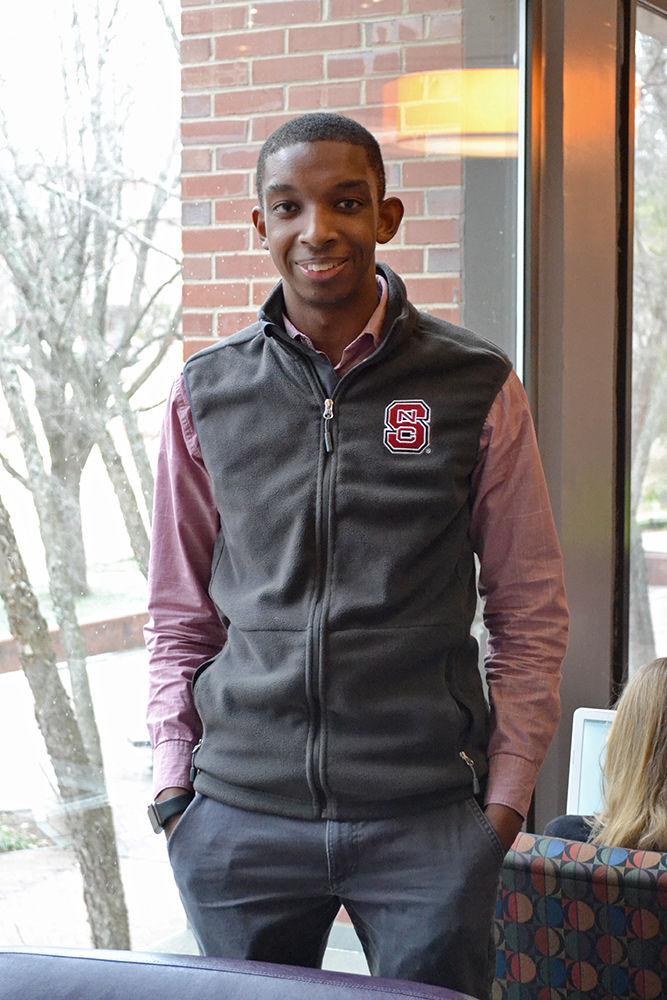At 22 years old, Kobi Felton started FDOC, “first day of classes,” the same way many of his NC State classmates did … in an 8:30 a.m. class on Centennial Campus. It’s a chemical engineering class on the topic of controls. Last week, he was in San Francisco to meet with industry professionals interested in his senior design project, an online cloud laboratory. He’ll graduate in May and next year, it’s back to learning at a new school, the University of Cambridge.
Felton is a fourth-year studying chemical engineering and a Park Scholar. In December of last year, Felton found out his application was accepted and he would become the third Marshall Scholar in the history of NC State.
“I don’t know if I ever thought I could get it [the scholarship],” Felton said. “I was reading a lot of papers in this discipline [flow chemistry] and, every paper, I’d look at the author who wrote it and they were all in the U.K. so I was like ‘that’s where I need to go.’”
The scholarship, founded in 1953 to celebrate the United States and the United Kingdom’s long-term close relationship, will allow him to attend two years of postgraduate school at any university in the United Kingdom. For Felton, that means one year at the University of Cambridge and one year at Imperial College London. He’s no stranger to moving around.
Felton has lived in many different countries throughout his life. Born in Illinois, Felton’s family then lived in Houston, Texas, and then Doha, Qatar. From Qatar, Felton next lived in Lagos, Nigeria, where he attended high school before coming to NC State. Felton, who has been to around 30 countries, had this to say about what all of his moving around has taught him about life:
“People are people,” Felton said. “Often, when you read the news, people are portrayed as ‘others,’ and when you meet people in person, you realize they have the same desires, hopes and dreams for their own lives and their children. That’s what I’ve learned, to treat people like individuals.”
It was the well traveled aspect of Felton’s life that impressed Ruben Carbonell, a professor of chemical engineering at NC State and Felton’s mentor through the Park Scholars program.
“He was very earnest and very serious about a career,” Carbonell said. “He wanted to be a chemical engineer and that’s my department. Kobi’s family had a history of moving around to various countries and various places and I thought that was an interesting background.”
Felton will be attending University of Cambridge to study reaction engineering. After that, it’s off to Imperial College London’s Department of Chemistry to look at scaling up production of nanomaterials for solar cells. Currently, Felton works in a research lab focused on microscale flow technologies under Milad Abolhasani, an assistant professor in the department of chemical and biomolecular engineering. It’s not all about class though. Felton has had a long laundry list of current and past extracurriculars throughout his four years at NC State.
During his first year at college, Felton volunteered with the Mexican Consulate in Raleigh. Felton also worked with Kidznotes, an organization that helps local children gain access to music lessons. Last year, Felton was the president of the NC State chapter of the National Society of Black Engineers, which Felton said hosted over 20 major events during the 2016-2017 school year. For Felton, keeping busy is not just about solving problems.
“I have been blessed to have a really good support system,” Felton said. “My parents really encouraged me alway to have a disciplined, strategic approach to solving problems and that’s what I try and do now; I look at tough problems and try to solve them. If all you did was stuff that was easy, then you wouldn’t be doing anything meaningful.”
One such problem is the problem of access. Through his engineering entrepreneurship senior design course, Felton is exploring the idea of a cloud laboratory.
“I’ve always been interested in figuring out ways to help other people achieve their full potential,” Felton said. “That’s why I’ve always been interested in the cloud laboratory concept. You can’t really do science online. If you want to do an experiment, you have to have a physical laboratory. The idea here is that, you go online, you specify an experiment and then robotic systems run the experiment in a sandbox for you and give you back the results. It gives scientists access to tools that allows them to increase their productivity significantly.”













